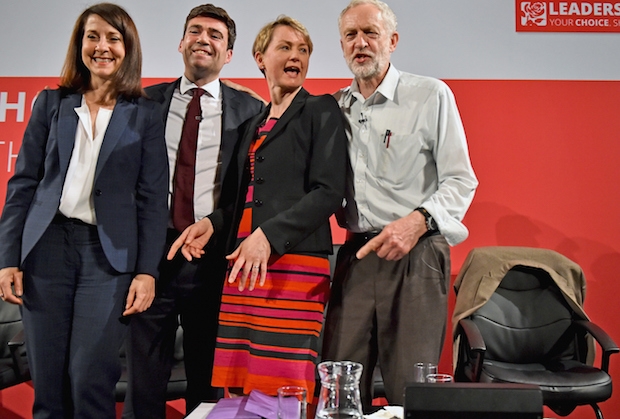Well, look, it’s Ed Miliband’s fault isn’t it? Thrice over in fact. First for winning the Labour leadership, then for leading the party in the way he did and, finally, for leaving the leadership so abruptly.
There are many ways of measuring the funk into which Labour has plummeted but one of the best is to consider that it is now seriously believed, in some quarters anyway, that Jeremy Corbyn might not be the worst choice as leader. Believed, I mean, by sensible people of reasonably sound mind who recognise that Corbyn would be a disaster for Labour and, quite possibly, for Britain. (If you doubt that, consider whether the country benefited from Iain Duncan Smith’s tenure as leader of the Conservative party. Hint: it did not.)
The alternative, after all, appears to be Andy Burnham. Let that sink in for a moment.
Andy Burnham.
Selecting Burnham is just a slower-burning form of denial. The Michael Howard to Corbyn’s IDS. That doesn’t, granted, mean Labour have many attractive options (Liz Kendall’s campaign tactic of telling Labour members they’re idiots may be intellectually sound but seems electorally unwise, for instance) but there you have it.
Which brings us back to Miliband. Labour’s post-election post-mortem would always have been a difficult, unpleasant, business. On a human level – Ed does human, remember – you can understand why Miliband didn’t want to stick around for it. Politics, in the age of mass and social media, is an intensely personal and often harsh and wounding business. Why hang on to let the bastards kick you around some more?
And yet leaving so abruptly ensured that Labour would neither have a coherent response to the new government’s immediate moves nor the time and space in which to properly think about the party’s own future. Miliband’s abdication announced he was taking some pseudo-responsibility for Labour’s election disaster even as it also absolved the party of any need to think seriously about where it might go next.
The result is a leadership contest between two Continuity Candidates, one loony-lefty and a ‘serious’ truth-teller with no chance whatsoever of prevailing. None of it is actually very serious at all.
But, for all his talk of standing-up to the powerful, Miliband’s leadership ducked the most pertinent issue of all. He never confronted the Tory message that Labour was wholly, or even just disproportionately, responsible for the financial crisis. But nor did he accept the critique and try to move on. He just denied its existence, insisting it was all irrelevant. It was as though he thought the Tories would decline the invitation to kick him in the nuts. I mean, c’mon, man.
And so Labour’s credibility on the single biggest question of all – its capacity to manage the national finances – was shot from the beginning. Then again, you should never under-estimate the power of wishful thinking in politics.
Still, if Miliband had hung around for a while, the party could have had time and space to, as they say, ‘take stock’. The moments after a calamity of this sort are not necessarily the best moments at which to plot a new direction. The wounds are still open and the scale of the damage may not even be wholly apparent yet.
Sure, Miliband might have been seen as the lamest of lame ducks but he’d still have better served his party if he’d remained leader, at least for a short period of time. He need not even have announced, at least not immediately, his intention to resign. At the very least he could have said he’d remain leader until Christmas and that the party should elect a replacement leader in the new year. Had that happened I doubt Jeremy Corbyn would have made it onto the ballot. There would have been a cooling-off period. Miliband’s decision to scuttle from the field ensured there’d be no such thing.
Of course it’s difficult to stay on. But if, as politicians always – and often rightly – say it’s all about what’s best in the public interest then staying on is often likely to be the better option. Quitting doesn’t always help matters. (Hello Gordon Brown, by the way!)
It is quite something to see the Labour party in its current mess. 43 per cent of its current members appear to believe Neil Kinnock was a trimmer and a sell-out. Neil Kinnock! Nothing else can explain, save some perverse enthusiasm for martyrdom, the party’s apparent enthusiasm for a pound shop Tony Benn. Benn was a disaster for the Labour party when he was in his pomp; his heirs will be no better for it today. And that would still be the case if this were, as in fact it is not, 1983 and not 2015.
It’s not just Ed’s fault, I suppose, but a lot of it is still Ed’s fault.







Comments